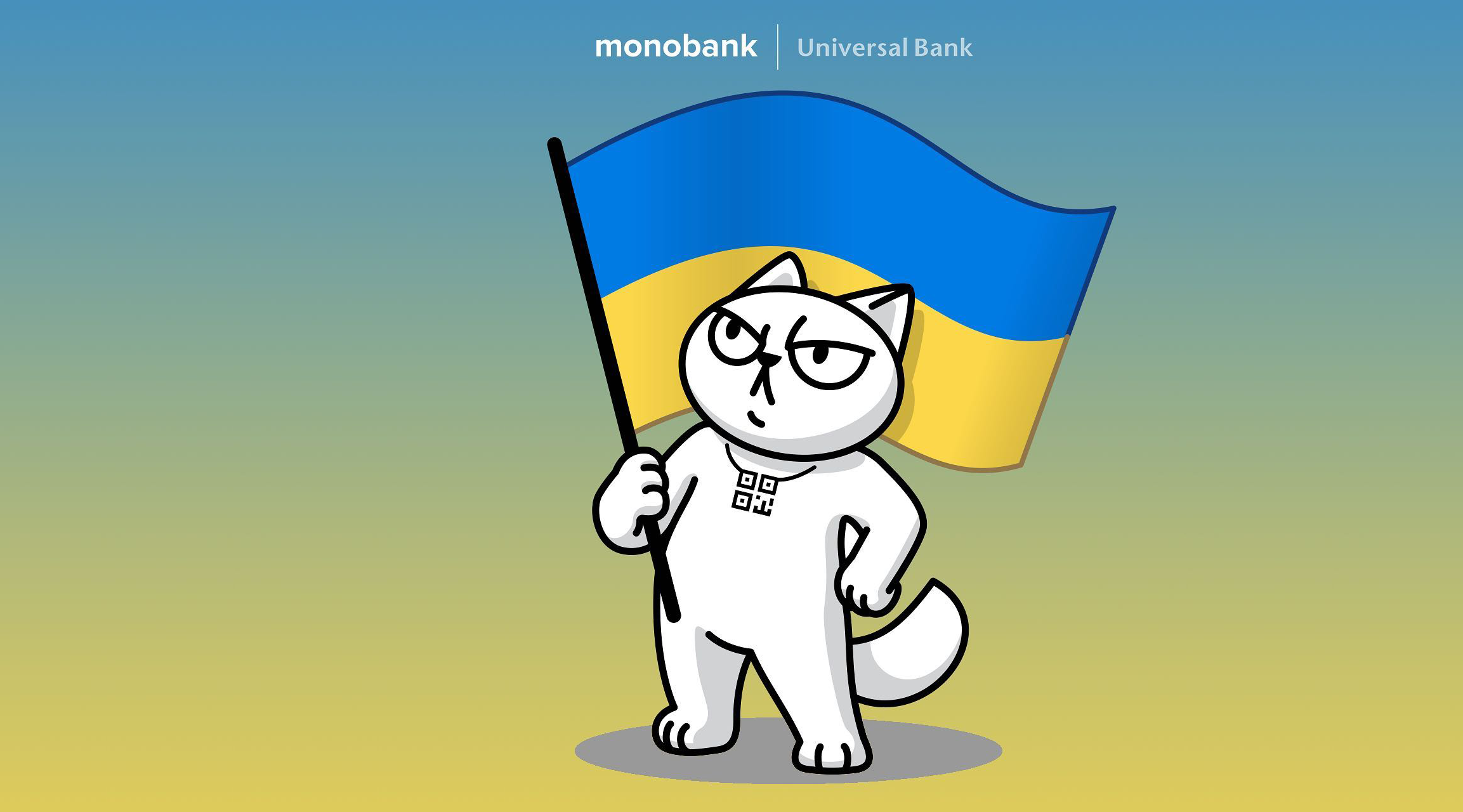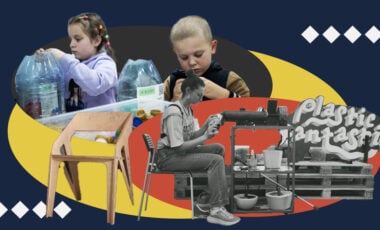Who and how helps blind people during the war: work, scholarships and education
Interview with the patron Denis Lutsenko about volunteering, the irreplaceability of call centers in wartime and 5 main qualities that you can not spare if your task is to talk to people on the phone

What is the problem?
The war impacted everyone, and vulnerable segments of society became even more vulnerable. During this difficult period, they need to be helped to evacuate, work, and even study. We explain who helps them and how.

What is the solution?
In 2020, we already wrote about blind people. Then we interviewed the course administrator Mykola Lahotskyo and one of the teachers Denys Lutsenko, who taught students a new specialty, which is a call center manager. We talked about how courses help blind people find high-paying jobs in a pandemic.
Now we have contacted Denys again to find out how he and the entire online school community are coping with perturbations at this difficult time. As it turned out, the school not only continues to work, but thanks to Mykola Lahotskyi, Denys himself and a team of his colleagues from Monobank, former and current students of IUS IT Network have the opportunity to receive financial support. Once in a safe place, they can work and even receive a scholarship for diligent study.
How does it work?
"In the first days we had a shock and we temporarily suspended our classes to find ourselves in the situation."
Denys speaks about the recent times after russia's full-scale invasion of Ukraine. The break did not last long and he began volunteering. A friend from Kharkiv, Andrii Butenko, called Denys and asked for help to evacuate students from the Korolenko Kharkiv Educational Complex out of the city. Children from 13 regions of Ukraine study in a boarding school, and those boys and girls whose parents were not in Kharkiv remained at school: it was dangerous to pick them up because the city was under fire.
Oleksandr Bilousov, the director of Korolenko's educational complex told us, that it was decided to evacuate the children firstly to Lviv, and later to Poland, to the friendly school in Dabrowa Górnicza:
"We managed to evacuate 71 people: 35 students, as well as school graduates who remained in Kharkiv, teachers and staff of the school and attendants. Now the children are safe, and have already begun the educational process; students, our former students, have already been assigned to universities, and workers are employed," Oleksandr says.
Assistance came from various sources, including Denys Lutsenko, who contacted Monobank co-founder Mykhailo Rohalskyi and provided funds to help children buy the necessary medicines and meet their other needs.
"We are currently trying to help not only our students from the IUS IT Network, but generally all people with disabilities who come to us," Denys says. The IUS IT Network students who are already in a safe place are working. Some perform certain tasks on behalf of Denys: call people of the provided base and collect information about where and what help is needed. Others work in call centers, which, as it turned out, are especially in demand during the war.
"They are a great help to coordinate volunteers, direct and distribute humanitarian aid," the hero explains.
How training is conducted in conditions of war
As far as one of the first stages of the war was over, enemy troops were driven out of Kyiv and Chernihiv regions, the occupied cities were gradually liberated, and people came to their senses from the shock, IUS IT Network decided to resume its training:
"We see that students need classes, and our format allows them to be held even now." One can listen to courses anywhere, because classes are held remotely, online and even outside home students still have the opportunity to attend classes. All they need is the Internet and a computer or smartphone.
However, it is necessary to listen to the courses and adhere to safety measures, for instance in case of an air raid alarm one must be sure to move to the shelter. Because the courses are conducted online, the lesson does not end if most of the group is in cities where there is no air alarm. But you should not worry that a student from the city where the alarm was announced will miss part of the class, because later teachers help them to make up for lost time individually.
What can one learn?
One of the main training courses at IUS IT Network is sales management. Students learn the basics of telephone sales, undergo both theoretical training and practice. Denys Lutsenko teaches this course, and he finances it himself by paying for IP telephony calls, the work of a sound director and coaches who communicate with students, playing the role of a client on the other end of the wire. Denys also sponsors prizes at competitions. In addition to sales management, there are many other courses. Unfortunately, providing volunteer projects is always a difficult task, and this year the team of the organization has not yet managed to attract grant funding, but the project is quickly gaining sponsors:
"Last year, the IUS IT Network received a lot of support from the Monobank team, the whole team responded enthusiastically to the offer to help. Everyone is involved: the founders, the marketing director, who helps build the right course strategy, and the contact center manager, who provides valuable practical advice," Denys says. According to him, the bank is working to make its services inclusive: the care service of Monobank is the only one in Ukraine that has adapted its consultations for blind users:
"We explain everything in a way that makes it clear to the blind user," our hero explains.
Classes are held in a virtual room online: blind students learn to work with a bank application, transfer funds from card to card, pay for utilities, and, of course, learn about the rules of secure usage of bank cards. And school students are taught to work with the Glovo food delivery service program.
Earlier, Rubryka talked to Denys last autumn. Since then 60 people have been trained at IUS IT Network courses, and the number of people willing to study is constantly growing.
"Now the seventh group has graduated, and the queue is two more groups ahead! Information about us is spread by word of mouth, and if we used to look for students, now they are looking for us," Denys says.
IUS IT Network courses are free for students with disabilities. Moreover, during the Sales Management course, competitions with practical and theoretical tasks are held between students for knowledge of the learned information. The competition takes place in several stages, and the finalists receive cash prizes. This started two years ago, but since then the amount of the prize has increased several times, although only one person, Denys Lutsenko, sponsors such awards as before.
"I understand that it is important to support students during the war, especially since some of the social benefits they have to receive are delayed. Therefore, we decided to pay a monthly scholarship of 2,000 hryvnias to the three best students in the group. It's just for good learning results," Denys says.
Work after study and practice
Liuba Slyvka is a graduate of IUS IT Network and part-time assistant of course teachers, including Denys Lutsenko. "I live by these courses and this project," the woman says. By the way, she is also a poet.
Liuba lost her sight in adulthood. She needed to raise a young daughter and, as she said, learn to live again, in the dark. She learned about IUS IT Network courses back in 2018 from an acquaintance. Back then classes helped her learn to use a computer, and later to gain many other useful knowledge that she can now apply in her professional career:
"I have had a laptop for a year, but I could only use it with the help of 'hints,' here and there I learned about some keyboard shortcuts," Liuba says. "But in the courses, she first learned to use NVDA, and then Word, Excel, took two modules to learn English, completed courses on the Monobank program, took a paid internship in three different companies, and in March 2021 became a student of management at Denys Lutsenko's.
Liuba shared that the worst thing in the new profession of call center manager was the first 20 calls. "I started with cold calls, that is, these people did not wait for my call, they did not know who I was, and I dialed the numbers of the first customers with a lump in my throat. And then I gained more experience and fear passed. Of course, there were different customers: I remember a case when a person offered me very obscene things. I was confused, although I already had a serious practice. But I overcame everything, and when the practice ended, I was even sorry," Liuba recalls with a smile.
We asked Liuba Slyvka about the main qualities that should be present when you work with people on the phone, and received some practical advice:
- The first is friendliness. A smile should not leave your face even if you are not seen.
- You can create a positive impression if the operator has a cheerful voice.
- The ability to communicate with people is important.
- You can't take the negative from the client, you need to learn to filter what you hear.
- The most important thing is self-confidence. This is the key to success.
You can register for courses now. To do this, contact Liuba by writing to her on Facebook or by phone +380997521708.
How to become a patron?
You can also help the school to grow by making a donation. Details for payment:
Public organization ІУС
USREOU: 33981156
Bank: Kredobank
IBAN: UA 82 325365 0000026007010957189
Purpose of payment: Charitable contribution

























































